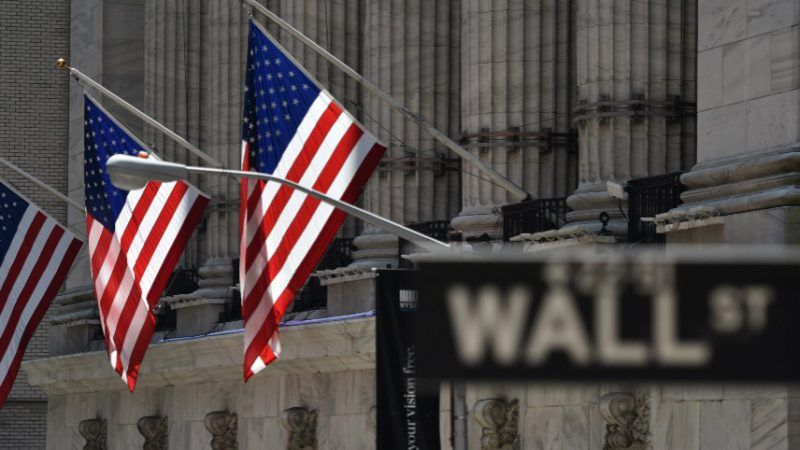Trump Deserves Some Credit for Stock Market Gains
An emerging consensus that President Trump doesn't deserve credit for the stock market boom since his election deserves a second look.


In an era of political polarization, here's one item that's rapidly emerging as a rare bipartisan consensus: President Trump doesn't deserve credit for the stock market boom since his election.
"Can we thank Trump for the stock market boom? Short answer, no," a scholar at the center-right American Enterprise Institute, Desmond Lachman, wrote in a piece published by Newsweek.
The pollster to Hillary Clinton's presidential campaign and to President Obama, Joel Benenson, tweeted: "Truth about @realDonaldTrump's 'record' stock mkt: he inherited from @BarackObama 2nd longest bull mkt in history."
As with most items on which there is rare bipartisan consensus, however, this one deserves a skeptical look. To understand why, try imagining the opposite scenario. What if, after Trump's election, the stock market's value, as measured by indices such as the Dow Jones Industrial Average, the Standard and Poor's 500, and the Nasdaq Composite, had gone in the other direction? Imagine it had plunged 20 percent and eradicated $4 trillion or $5 trillion in value.
Does anyone really believe that the press, the think tank folks, and Democratic operatives would be running around explaining that really what happens in the stock market isn't under Trump's control, and that it's really attributable instead to the preceding administration, the Federal Reserve, or the value of the dollar? No way. Instead they'd almost certainly be blaming Trump.
While Obama's team now boasts about the stock market's performance on his watch, it was singing a different tune back in March 2009. Politico reported back then, "Obama's team has repeatedly cautioned reporters against judging him by the ups and downs – and lately downs–of the stock market, scraping 12-year lows."
The stock market, in other words, is like a lot of things: politicians want to take credit for it when news is good, but absolve themselves of responsibility when news is bad. One might hope for a more consistent perspective from journalists or from independent research organizations. Imagine, say, an election-day to election-day presidential job-performance dashboard that included data on measures such as stock market performance, the value of the dollar, job creation, unemployment, labor force participation, and real GDP growth.
It can indeed be hard to isolate a president's influence on all these things from other variables, such as, say, the composition of Congress. Should Obama or Bill Clinton get credit for the stock market booms in their terms? Or should the Republican Congresses under which they occurred? And how does one accurately account for the period post-election but pre-inauguration, when stock market gains may reflect anticipated improvements, but growth results measure existing budgets and policies?
In the cases of both the Bill Clinton and Obama stock market rallies, the prosperity wasn't sufficient, or widely enough shared, to bring about the election of a successor from the Democratic Party. That is a caution for Trump. If he wants stock market gains to translate into re-election for himself or for a chosen successor, the index performance will have to translate into feelings of economic security and opportunity for individual voters.
No politician, however determined, can entirely insulate American individuals or families from the ups and downs of the business cycle or from the challenges of a competitive market economy. It's enough, usually, if a presidential administration merely refrains from doing things that could make matters much worse. On that front, Trump has flirted with danger: protectionist tariffs, restrictions on immigration, even some trial balloons of proposed marginal tax rate increases for individuals. The stock market gains indicate that a lot of people view these as negotiating ploys, posturing, or political theater rather than as policies that will actually be enacted.
Or perhaps the view is that other steps Trump takes—reducing regulation or slowing the growth of it, reducing corporate income tax rates, allowing more energy exploration—will outweigh any negatives. In other words, there's a decent case that Trump does deserve at least some credit for the stock market gains.


Show Comments (54)